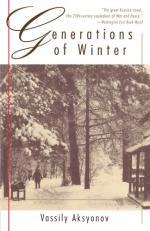|
This section contains 6,931 words (approx. 24 pages at 300 words per page) |

|
SOURCE: "Aksenov and Stalinism: Political, Moral and Literary Power," in Slavic and East European Journal, Vol. 30, No. 4, Winter, 1986, pp. 509-25.
In the following review, Meyer discusses the influences that Bulgakov's Master and Margarita and Journey Into the Whirlwind, the prison camp memoirs of Aksyonov's mother, had on The Burn.
Stalinism has necessarily been a central subject of serious Russian literature since the 1930s. The grotesque nature of Stalinist society has generated memoirs more fantastic than fiction and novels especially rooted in history. Survivors of the experience are unavoidably concerned with the moral problems of resisting and responding to evil, torn between a desire for revenge and the ideal of forgiveness. Aksenov's The Burn (Ozhog) must be read in the context of this history and the texts it produced. The burn of the title refers both to Stalinism and to the burn of creativity. By recapitulating his own biography...
|
This section contains 6,931 words (approx. 24 pages at 300 words per page) |

|


